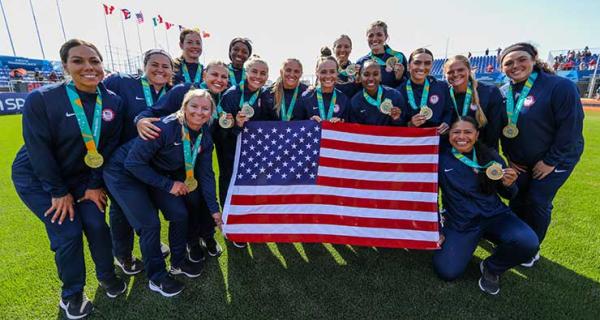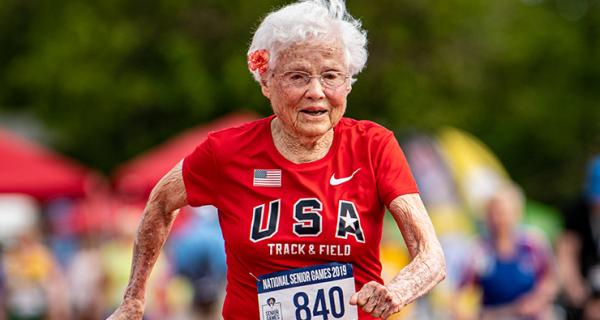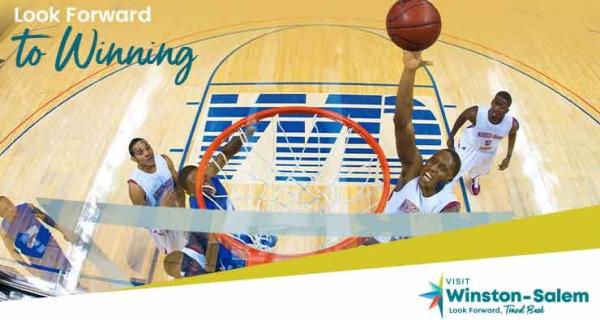9 Thoughts to Mark 50 Years of Title IX
Women leaders in sports tourism are encouraged by progress and see specific areas of improvement to come.

Tammy Dunn may not have understood it at the time, but joining a sixth grade basketball team was a big deal. She was the only girl on the court, but that didn’t matter. “I was a basketball player, and I was treated like one of the players,” says Dunn, executive director of the Snohomish County Sports Commission outside of Seattle.
A year later, at a country school in Gallatin Gateway, Montana, enough girls (12) signed up to form their own team. Dunn’s scholastic career continued through her graduation in 1982 from Belgrade High School (also in Montana), a small school where there were limited options for boys and girls.
Dunn’s story reflects the progress of Title IX, a historic ruling comprised of a mere 37 words that changed athletics forever:
“No person in the United States shall, on the basis of sex, be excluded from participation in, be denied the benefits of, or be subjected to discrimination under any education program or activity receiving Federal financial assistance.”
Fifty years after Title IX took effect on June 23, 1972, women’s sports have made undeniable progress. Yet, the fact that continued progress remains noteworthy is a testament that work remains to be done.
“I hope we won’t be talking about Title IX in a half-century because we won’t need to be,” says Monica Paul, executive director of the Dallas Sports Commission.
While we wait for that day, Connect Sports shares nine thoughts about Title IX and the sports tourism industry.
1. 50 Years Isn’t That Long Ago
A half-century can feel like a lifetime ago, but not so in terms of social change. For every situation like Dunn’s, there are others who missed out on opportunities. Linda Logan, executive director and CEO of the Greater Columbus Sports Commission, was in high school when the law came into effect. While she missed out on what surely would have been an outstanding athletic career, Logan pushed on to become one of the most influential women in sports tourism. “I am so grateful for those that paved the way for me to take the baton. They gave me a chance to make an impact in sports,” says Logan.
2. Sports Is a Life Changer
Janis Burke, CEO of the Harris County—Houston Sports Authority, credits Title IX for being able to go headfirst into athletics. “I was able to become an elite diver and was even offered a college scholarship, which meant a lot at the time since I grew up in a family with a single mother who made just over minimum wages,” says Burke.
Such stories are common despite different destinies. Burke dreamed of a spot in the Summer Games before her mother passed away from cancer, which diverted Burke’s path to helping raise her younger brother. Yet that diving experience clearly stuck with her, as she runs one of the most successful sports commissions in the country—one recently awarded the 2026 FIFA World Cup along with Paul’s Dallas commission.
3. College Experience Counts
You don’t have to have been a college athlete to be in sports tourism, but it doesn’t hurt (aside from the risk for injury). Paul was a volleyball player before a torn ACL changed her path. Sports Milwaukee Director Marissa Werner also played volleyball. Discover LeHigh Valley Vice President of Sales Bree Nidds was a varsity sailor.
It’s fair to say these college experiences shaped their lives, and many others, to this day. Logan notes her director of business development, Celia Anderson, played college basketball at University of Arkansas and has a daughter who will play at Harvard starting in the fall. “Sports are a vehicle that can take girls and women to places they could never dream of without them,” Logan says.
4. The Reach Is Beyond Sports
Sports is often a kickstarter for social change, and this case is no different. SportsPittsurgh Executive Director Jennifer Hawkins says it’s virtually impossible to find a person who has not been affected by Title IX in some form. “If you know a woman teacher, public service employee, veteran or, of course, a current or former interscholastic/intercollegiate student-athlete (after 1972)—and I personally know many of each—then you know someone directly impacted by Title IX.”
5. Soccer Is Leading the Way
U.S. Soccer has been at the center of the gender equality debate for some time, thanks in large part to the success of the American Women’s National Team. This year, the pressure to reach parity paid off with the NGB announcing the men’s and women’s team would receive equal pay.
The landmark moment didn’t go by unnoticed and may be a harbinger for what’s to come in other industries. “I’m happy for the U.S. Women’s Soccer National Team,” says Hawkins. “This moment should serve to inspire others to push back and, hopefully, cause other organizations to rethink their strategy on wage distribution.”
Adds Paul: “I honestly never thought we’d get to that level. It was incredibly exciting and something we have to celebrate. And hopefully it doesn’t end there.”
6. There Are Some Obvious Growth Areas
Women’s basketball, particularly on the college level but also in the WNBA, is growing in popularity. Professional wrestling often highlights women in main event matches too. Dunn sees some other sports as naturals to follow suit. “Baseball, football and rugby are examples,” says Dunn, drawing attention to Baseball for All, a national organization dedicated to all-women’s teams. “The opportunity for girls to play sports with other girls in the same sport is inspiring.”
7. Paying It Forward Is Inspirational
Logan mentions predecessors passing the baton. The women leaders in sports tourism are now in control, contributing in many ways to equality drives. Some of that involves mentorship behind the scenes, but Logan also enjoys the ability to make a big splash. “Whenever we have the chance, we try to level the playing field or bring something to the women’s game that was previously only seen on the men’s side,” she says. “One example of that was wrapping the team buses in school branding. We’re proud Columbus was the first city to do that at the Women’s Final Four in 2018, and again at the DI Women’s Volleyball Championship in 2021.”
8. The Future Looks Bright
Paul need only look into the Southern Methodist University classroom where she teaches to see progress. “In my first Contemporary Issues in Sports Management class, I had only six women in my classroom. Now, as the business of sports becomes a significantly more plausible path for women, my classes are much closer to being a 50-50 split,” says Paul.
Among CVBs and sports commissions, the numbers rise too. Logan, Dunn and Burke are among the first line of trailblazers. Hawkins is among a newer generation of organizational leaders, an area the group interview agrees has room to grow. “We've seen shifts in women's sports participation, as well as employment in federally funded occupations, but the gap remains in leadership, where true equity resides,” says Hawkins.
9. Title IX Has Worked
The short answer to the most obvious question regarding Title IX is that the legislation has been effective in leveling the playing field. But that doesn’t mean there is not room for improvement. Says Paul: “We can always do better. Work like this is never finished. It’s about steadily making progress over time.” Logan agrees: “We can’t rest on our laurels.”
No one interviewed was willing to predict gender equality will be achieved in another 50 years. Dunn eloquently sums up the ultimate goal: “I would like to see that individuals are hired for a position because they are the most qualified candidate.”








